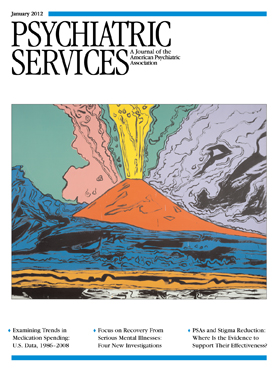Perceptions of the State Policy Environment and Adoption of Medications in the Treatment of Substance Use Disorders
Abstract
Objective:
Despite growing interest in the use of evidence-based treatment practices for treating substance use disorders, adoption of medications by treatment programs remains modest. Drawing on resource dependence and institutional theory, this study examined the relationships between adoption of medications by treatment programs and their perceptions about the state policy environment.
Methods:
Data were collected through mailed surveys and telephone interviews with 250 administrators of publicly funded substance abuse treatment programs in the United States between 2009 and 2010. Multiple imputation and multivariate logistic regression were used to estimate the associations between perceptions of the state policy environment and the odds of adopting at least one medication for the treatment of substance use disorders.
Results:
A total of 91 (37%) programs reported having prescribed any medication for treatment of a substance use disorder. Programs were significantly more likely to have adopted at least one medication if they perceived greater support for medications by the Single State Agency. The odds of adoption were significantly greater if the program was aware that at least one medication was included on their state's Medicaid formulary and that state-contract funding permitted the purchase of medications.
Conclusions:
States may play significant roles in promoting the adoption of medications, but adequate dissemination of information about state policies and priorities may be vital to further adoption. Future research should continue to study the relationships between the adoption of medications for treating substance use disorders and the evolving policy environment. (Psychiatric Services 63:19–25, 2012)



